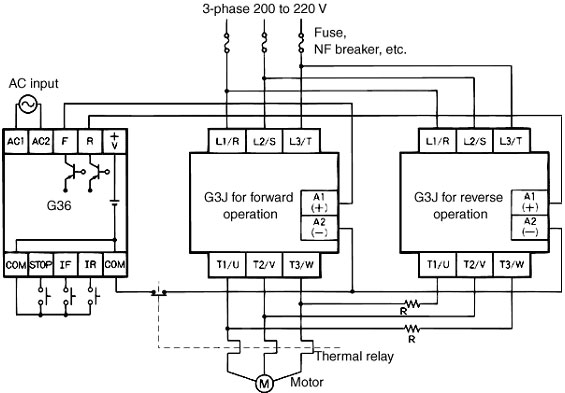Why is a switching time lag necessary for the forward and reverse operation of a three-phase motor?
The forward and reverse operation of a three-phase motor is conducted by switching two phases. If the Solid-state Relays for forward and reverse operation are switched ON simultaneously, a phase short-circuit will result through the two Solid-state Relays, causing the Solid-state Relays to breakdown.
Also if the forward and reverse Solid-state Relays are switched over immediately, both Solid-state Relays could become ON at the same time because the Solid-state Relays reset time varies by up to a half cycle, which would cause the Solid-state Relays to breakdown.
When an Solid-state Relays is turned OFF, counter-electromotive force may be generated from the motor and cause a malfunction. If this occurs, it is necessary to increase the time lag between switching.
Make sure that there is a time lag of at least 100 ms.
Forward and Reverse Operation Example
G3J Simple Solid State Contactors with G36 Reversible Units

To prevent short-circuits, insert the protective resistance R into the circuit. The value of R can be calculated using the following equation.
G3J-205BL
For example, G3J-205BL withstands an inrush current of 150 Apeak. Therefore R > 200 V x √2/150 A = 1.9 Ω
Considering the circuit current and ON time, insert the protective resistance into the side that reduces the current consumption.
Obtain the consumption power of the resistance from the following.
P = I2R × Safety factor
(I = Load current, R = Protection resistance, Safety factor = 4)
Recommended Values of R
| Model | Applicable Motor | Protective resistance |
| G3J-205BL(-2) | 0.75 kW | 2 Ω 100W |
| G3J-211BL(-2) | 1.5 kW | 1 Ω 200W |
| G3J-211BL(-2) | 2.2 kW | 1 Ω 400W |
Note:
1. Make sure that safety devices, such as fuses or NF breakers, are used.
2. G36 can be used only with G3J with a rated operating DC voltage.
3. G36 can be use by shorting the COM and IF (IR or STOP) terminals.
4. To prevent short-circuits, insert the protective resistance R.
5. Two of G3J-S and G3J-T cannot be used together for forward and reverse operation.